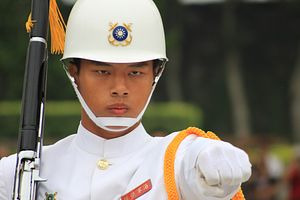Though North Korea dominates the headlines today, tensions across the Taiwan Strait continue to play out amid lingering concerns about potential military conflict involving not just China and Taiwan, but the United States as well. The Diplomat recently sat down with Ian Easton, research fellow at the Project 2049 Institute and author of the recent book The Chinese Invasion Threat: Taiwan’s Defense and American Strategy in Asia, to get his take on the regional situation and the implications for U.S. policy.
There is often talk about the possibility of war in the Taiwan Strait. What is your sense about the actual likelihood of this occurring?
I have mixed feelings about the actual likelihood of war. On the one hand, Taiwan is actually quite well-defended and highly defensible. As one U.S. Army colonel who was stationed in Taiwan told me, “China would be stupid to invade Taiwan. It would be about as stupid as getting in a land war in Asia.” One the other hand, in doing research for the book, I saw how focused the Chinese military is on preparing to invade Taiwan and the specific nature of some of their plans for the war. That was not comforting. Overall, I guess I’m cautiously optimistic. Certainly I’m not losing any sleep. While the American track record on supporting Taiwan in recent years has been poor, there seems to be a growing sense in Washington that much more needs to be done and can be done to preserve the peace.
One of the first things that is often said with respect to cross-strait relations is the idea of a vast military imbalance in favor of the mainland. What is the state of this today?
Appearances can be deceiving. On the surface, China has an overwhelming military advantage over Taiwan. Dig a little deeper, however, and it quickly becomes apparent that the Taiwanese military has great intelligence on the threat and is very well prepared to repulse invasion. They are professionals and have been preparing the battlefield for well over six decades. That’s why the Chinese military is so heavily focused on covert actions and psychological warfare operations to demoralize the Taiwanese. They know perfectly well that Taiwan is a hard target, even if the United States doesn’t arrive to the fight in the first days of war.
As long as the Taiwanese people are resolved to defend their democracy, they have a very good chance of coming out on top. And I firmly believe the Taiwanese are capable of mounting a ferocious defense of their homeland. I lived in Taiwan for over four years and saw firsthand how capable and tough the people there are, and I’ve seen the terrain, the beaches, the tunnels — how dug-in they are everywhere.
The principal security concern for the Trump administration currently appears to be North Korea, rather than Taiwan. How does Taiwan fit into the overall list of U.S. security priorities in the Asia-Pacific?
These days, most people think North Korea is the biggest threat America faces, but that’s simply not true. A great power war between the United States and China over Taiwan would be far worse, and in many ways the Taiwan Strait is structurally less stable than the Korean Peninsula. No one in North Korea actually believes they could win a war against South Korea and the United States. In contrast, China’s leaders could conceivably think they have the upper hand against Taiwan, and they might soon begin to believe they could defeat United States too.
What are some of the steps that the United States can take in the coming years as these cross-strait dynamics play out?
My main message is that U.S. policy shouldn’t always just be about arms sales to Taiwan. Those are important, and definitely need to be expanded, but we Americans can’t arms race our way out of this problem and neither can the Taiwanese. That would be too easy. To deal with China’s emergence as a rival center of power, we need to reconsider our fundamental policy approach and develop a comprehensive national strategy. The current approach is ad hoc, self-contradictory, and not advancing our national interest in creating a more secure, free, and prosperous Asia-Pacific.
It is also important to keep in mind that China’s not a democracy, so it can outspend and out-build everyone else. Defense spending in democracies is always far more limited and less of a priority than in countries like China. As a result, by the early-to-mid 2020s, the Chinese will probably be able to overmatch every military in the Pacific, including the U.S. military. But if the United States can integrate its military more closely with countries like Taiwan, Japan, Australia, and the other democracies, there is no way China can win.

































